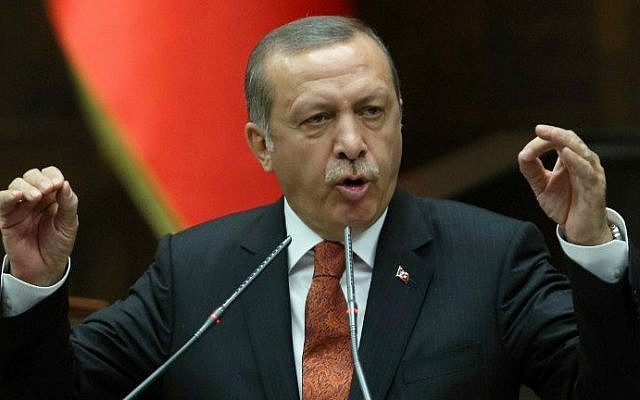
American and Turkish Presidents Donald Trump and Recep Tayyip Erdogan have made little effort to hide their mutual dislike. As with many rivalries, the two actually have a lot in common. Both like to play the populist strongman. Both have framed themselves as champions of conservative values. And both revile being told what to do by the other.
Trump’s anti-Islam rhetoric clashed with Erdogan’s staunch defence of Muslim identity from the moment Trump entered office. They have often riled each other up, to the delight of their supporters. But this diplomatic rivalry has now erupted into a full-blown row, one that is pushing both countries toward bold, and risky economic policies.
Turkey’s currency, the lira, is in free-fall. It has been for some time. It lost 45% of its value since the start of 2018. Whilst the Turkish economy had been in trouble for months, the lira took a further nosedive at the start of this week, when President Trump announced a doubling of tariffs on Turkish steel and aluminium.
Two weeks before, Trump had also imposed sanctions on the Turkish Ministers of the Interior, and of Justice. These pressures came in retaliation for Turkey’s refusal to release the detained American Evangelical Pastor Andrew Brunson, who is being held in Turkey on suspicion of involvement with the exiled cleric Fethullah Gulen.
Perhaps Turkey should have expected this. Trump likes to play political hardball, and to hit his rivals with financial punishments when he fails to get his way. And Brunson no doubt deserves Washington’s attention. But using sanctions as a first, rather than last resort has risky consequences.
“This employment of sanctions by the US administration has been unusual: escalation has taken place rapidly, and the sort of sanctions employed (doubling tariffs for two commodities) has not been standard in US tradition.” Dr Clara Portela, University of Valencia told Al Bawaba
Dr Clara Portela, an expert in the political effects of sanctions at the University of Valencia told Al Bawaba:
“This employment of sanctions by the US administration has been unusual: escalation has taken place rapidly, and the sort of sanctions employed (doubling tariffs for two commodities) has not been standard in US tradition. The blacklisting of two cabinet ministers of an allied government is also unprecedented.
By adopting such far-reaching measures, the US approach has attracted a great deal of media attention and could have an antagonising effect on Turkish elites at a time where the recently re-imposed sanctions on a next-door neighbour are being openly resisted by another long-standing US ally, the European Union. Here, the problem is not the use of sanctions per se, but the atypical nature, timing, effects and context of the measures chosen. They are a display of the disruptive power of US economic coercion, but they also risk making the sender country look more internationally isolated than the target, which would defeat their very purpose.”
Still, the trouble that Trump is creating for America will only affect them later down the line. Turkey, meanwhile, has to deal with the effects of sanctions right now, and it isn’t looking good for Ankara.
The lira hit a record low on Monday morning, trading at 7.24 to the dollar, which precipitated talk of an economic crash. It stabilised slightly on Tuesday after the central bank promised liquidity measures. But a crisis could still be around the corner if investor confidence in Turkey isn’t restored.

Andrew Brunson, the pastor being held by Turkey (AFP)
Yet Erdogan has flatly refused to make changes that might help do that. He has stubbornly avoided raising interest rates which, according to financial analysts, helped cause a massive increase in inflation.
Currently, Turkish inflation is at 16%, an extremely high rate for a European economy. Raising interest rates is the simplest way of driving inflation down, and with it, the cost of living. But Erdogan has previously described interest rates as “evil”, and has insisted he will not raise them.
This stance may reflect an Islamic prohibition against the collection of interest on debt, and it is likely to continue to influence Turkey’s economy. Erdogan gave himself the sole power to choose the Finance Minister in July, and proceeded to appoint his son-in-law. The family appointment, along with his son-in-law repeating that interest rates would not rise, exacerbated the financial crisis.
Instead, Erdogan seems to be banking on Turkey’s geo-strategic value to the world as a way out of his economic troubles. Turkey has been a volatile ally to Europe and America, but a critical one nonetheless. It is a NATO member, a member of the European Customs Union, and he upholds a controversial deal with the European Union to stem the flow of refugees attempting to enter Europe.
Yet Erdogan has always taken advantage of Turkey’s position on the edge of Europe and the Middle East. He leverages Europe’s need for Turkey against calls for greater solidarity between Muslim nations, and a readiness to court the west’s rivals. And while European leaders will now have to scramble to keep Turkey on side, Erdogan is making clear that he is looking the other way.
He has suggested that there is a plot afoot to undermine the Turkish economy, and that the solution is for non-western economies to trade with each other in their own currencies, effectively bypassing Euro-American markets.
And he announced plans to team up with two other recent recipients of American sanctions – Russia and Iran. In a speech, he said: “We are preparing to trade in our local currencies with the countries that we have the largest trade volume such as China, Russia, Iran, and Ukraine.”
Russia, freshly sanctioned over its suspected role in the poisoning of former spy Sergei Skripal in Britain, was quick to echo Erdogan’s promise. Speaking in a joint-conference with his Turkish counterpart in Ankara, Russian Foreign Minister Sergei Lavrov told reporters:
“The use of national currencies for mutual trade has for several years been one of the tasks that the presidents of Russia and Turkey had set. Not only with Turkey and Iran, we’re also arranging and already implementing payments in national currencies with the People’s Republic of China. I am confident that the grave abuse of the role of the U.S. dollar as a global reserve currency will result over time in the weakening and demise of its role.”
Russia, Turkey and Iran would no doubt like to see the end of the dollar’s international hegemony – not only to ease their financial woes, but also for its symbolic value. And now that China has become an economic power to rival America, talk of the dollar’s eventual decline has spread.
American sanctions are only applicable to transactions conducted in American dollars, or to firms which use US banks. Thus to get around sanctions, all one needs – at least in theory – is a bank detached from the American banking systems. However, this isn’t quite as easy an option as it sounds.
Neil Bhatiya, a Research Associate at the Energy, Economics and Security Program at the Center for a New American Security told Al Bawaba:
“All you need in terms of infrastructure is a bank that doesn’t do any business in dollars or with US persons (individuals or firms). There are a couple of issues with that arrangement however; it does add to transaction costs and time, which is why Iran discounted a lot of their oil sales to China and India prior to 2016. Also, using local currencies only limits the kind of business a bank can operate in.”
“All you need in terms of infrastructure is a bank that doesn’t do any business in dollars or with US persons (individuals or firms). There are a couple of issues with that arrangement however […]”
This is because the dollar has a crucial role in determining global commodity prices. International oil and gas prices are set in dollars. But tricky is not impossible. And for some sanctions-hit oil exporting nations such as Iran, there will be no choice but to adapt.

Turkish President Erdogan (AFP)
Dr. Kamiar Mohaddes, a lecturer in economics at the University of Cambridge and an expert on sanctions in energy markets told Al Bawaba:
“It is absolutely possibly to sell oil and gas denominated in currencies other than the US dollar. One example is the Shanghai International Energy Exchange, which launched a yuan denominated crude futures contract a few months ago. Alternatively, it is possible for say Europe to keep buying Iranian oil, having the contacts in euros and the finance backed by the ECB.
Another way around the US dollar, is barter arrangements: for instance, India pays for Iranian oil imports in rupees and in exchange Iran will import certain good from India. This is obviously not ideal. In the medium term, and not just because of the US sanctions, but also because of the trade wars initiated by the Trump administration, I’m confident that we will see a move to an alternative international payment system and in the long run possibly established commodity exchanges with yuan and euro denominated futures contracts.”
“I’m confident that we will see a move to an alternative international payment system and in the long run possibly established commodity exchanges with yuan and euro denominated futures contracts.”
If America becomes a predator in the global financial ecosystem, adaptation will be essential for survival. Essentially, President Trump risks speeding up the development of new ways around the dollar.
But speed is also the critical question for Turkey now. President Erdogan is so far adamant that he will not play the game the financial markets want him to. However, counting on trade with Russia, Iran, and other non-dollar economies to pull the lira out of its slump in time does not bode well for Ankara.
Trading in local, non-dollar currencies is perfectly possible. But the reason that the dollar currently dominates international markets is because it is stable. That cannot be said for the Russian ruble, the Iranian riyal, and certainly not the Turkish lira right now. True, Lavrov vocally embraced the idea of trading with Turkey and regional partners in local currencies. But Moscow has not made any financial commitments to Ankara either, and this is hardly surprising.
“Turkey, Russia and Iran could certainly see some trading activity in local currencies, but the value would very low”
Neil Bhatiya continued:
“Over the long-term, it may be possible for normal commercial business to be conducted in an alternative currency to the US dollar. However, it wouldn’t be the currency of any of those three countries, because there are obvious concerns about their political and macroeconomic stability. Most people do business in dollars because the US has a large and stable economic and political system and, as a result, the rest of the world accepts the US dollar. Turkey, Russia and Iran could certainly see some trading activity in local currencies, but the value would very low.”
If any country is going to be a game-changer in undermining the dollar, it will be China – the only nation with the economic clout and the volume of exports to rival America. It has the money to deal with higher transaction costs – China has hinted that it will continue to buy Iranian oil after U.S. sanctions on it kick in in November.
It also has a currency stable enough to persuade firms to deal in it, something that they will probably choose to do if Trump continues to inhibit business in more places around the world.
But China answers to its own interests, not to Turkey’s, or anyone else’s. And whilst China is powerful, it is also keen to avoid confrontation with the fiery Trump administration where it can. Turkey cannot expect a Beijing bailout. Ankara will no doubt see plenty of rhetorical support for plans to deal outside the dollar. And in the long-run that is bound to happen. But those plans will not come to the lira’s rescue soon enough.

